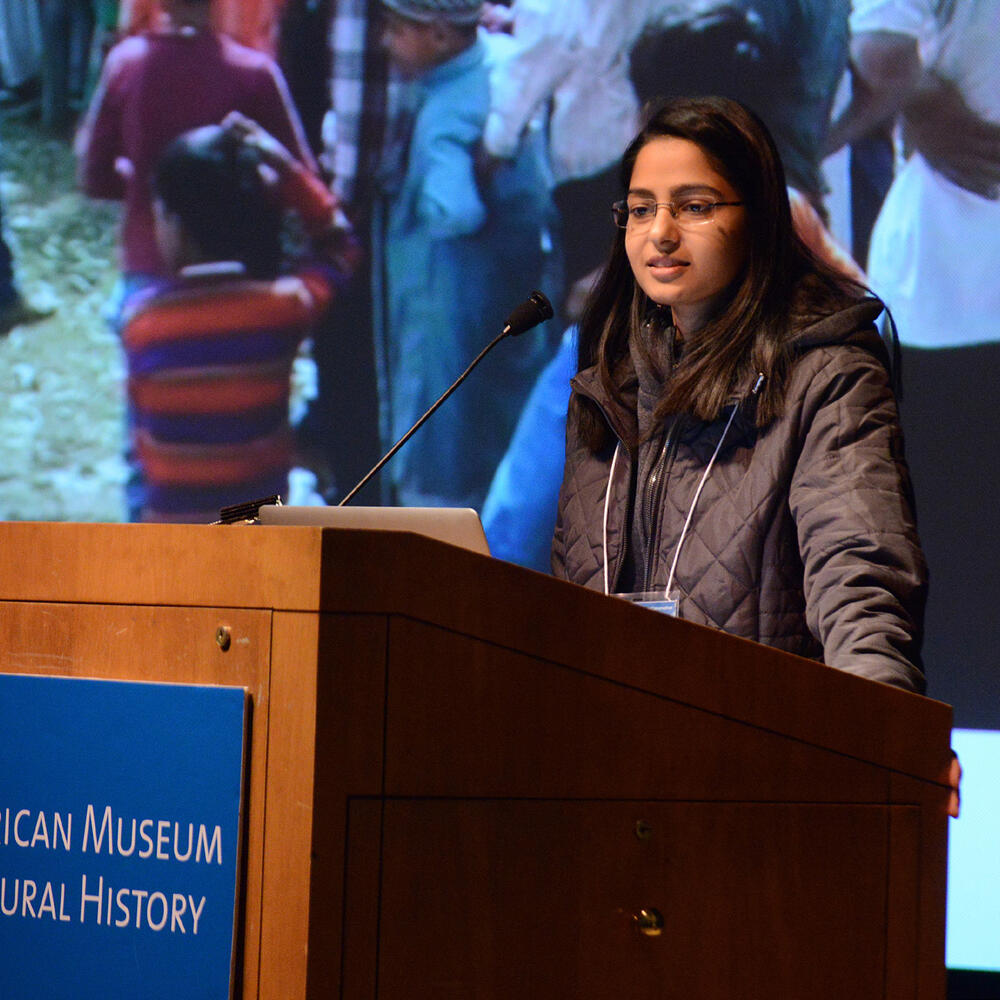SCCS-NY 2019
The Center for Biodiversity and Conservation and its partners invited students, postdocs, and early-career professionals to take part in the tenth annual Student Conference on Conservation Science – New York (SCCS-NY), which took place at the American Museum of Natural History, October 2–4, 2019.
As a part of the only international series of conservation conferences featuring students, SCCS-NY provided opportunities for emerging scientists to professionally network, gain experience, and present and get feedback on their work. Interactions with peers as well as leaders in science, policy, and management encourage collaborations, inspire further research, and create lasting professional connections.
“This is the only conference where I’ve seen mentorship being provided to students, and this is absolutely amazing. The feedback is very helpful and a chance to talk to mentors during lunches and during breaks is extremely valuable.” - Ph.D. Student

Understanding life on Earth, how to sustain it, and how to live with nature in equitable ways are the fundamental challenges of our time—challenges that are scientific and social. The 2019 Mack Lipkin Man and Nature Series Panel Discussion featured SCCS-NY plenarists Dekila Chungyalpa and Martín Mendez, along with Madhur Anand, a Poet & Professor at the School of Environmental Sciences in the University of Guelph, in a lively panel discussion. The panelists explored faith-based, ecological, and cultural approaches to conservation as we consider how different human endeavors have contributed creative solutions to environmental challenges. The panel was moderated by CBC Director Ana Luz Porzecanski.
The Mack Lipkin Man and Nature Series was established in honor of Dr. Mack Lipkin, Sr., by his many friends and admirers. Dr. Lipkin was a physician who was a gentle and powerful force in advancing the most humane and caring practices of medicine.
Building a Resilient Future; Where Science and Spirituality Converge
by Dekila Chungyalpa, Director, Loka Initiative
Dekila Chungyalpa is the Director of the Loka Initiative, a new education and outreach platform for faith leaders at the University of Wisconsin – Madison focusing on environmental and climate issues. Dekila was the recipient of the Yale McCluskey Award in 2014 for her innovative conservation work with faith leaders around the world and continued as associate research scientist at the Yale School of Forestry & Environmental Studies until 2018. She worked extensively on community-based conservation in the Himalayas and led the development of regional climate change adaptation and sustainable solutions for hydropower in the Mekong region for the World Wildlife Fund from 2001 to 2011. In 2009, Dekila created WWF Sacred Earth, a 5-year pilot program that built partnerships with faith leaders and religious institutions towards concrete conservation results in the Amazon, East Africa, Himalayas, Mekong, and the United States. She has served as an environmental advisor for Khoryug, an eco-association over 50 monasteries and nunneries in the Himalayas carrying out on-the-ground environmental projects.
More information on these different programs can be found at:
Dekila has a Bachelor’s Degree in International Environmental Policy from the College of Wooster, Ohio and a Master’s Degree in Sustainable Development from American University, Washington DC. She is originally from the Himalayan state of Sikkim in India and speaks Sikkimese, Tibetan, Nepali, Hindi and English fluently.
Collaboration and Capacity Building for Conservation Impact: Lessons from Southern South America
by Martín Mendez, Director, Southern Cone - Patagonia, Wildlife Conservation Society
Martín Mendez is a conservation ecologist based at the Wildlife Conservation Society. Dr. Mendez obtained a PhD in Ecology and Evolutionary Biology at Columbia University, where he also did advanced studies in Environmental Policy. His graduate studies were preceded by undergraduate degrees in Ecology at the University of Buenos Aires in Argentina, and in Conservation Biology at Columbia University in the US. Throughout his studies and during his Postdoctoral Research position at the Institute for Comparative Genomics, American Museum of Natural History, Dr. Mendez has used genetic, ecological and environmental data to better understand the structure and connectivity of natural populations. This integrated approach to ecology seeks to enhance conservation initiatives through the identification of management and conservation units and the environmental agents that influence such units. He has carried out terrestrial research in Argentina and has concentrated his efforts on marine research in Latin America and Africa, in collaboration with local and international NGOs. Dr. Mendez is also passionate about teaching and inspiring the next generation of conservationists.
Conference Program
Poster Abstracts
Conference Flyer
Major funding for 2019 Student Conference on Conservation Science has been provided by Marshall M. Weinberg.
Conference Partners
Conference Contributors
Pace University